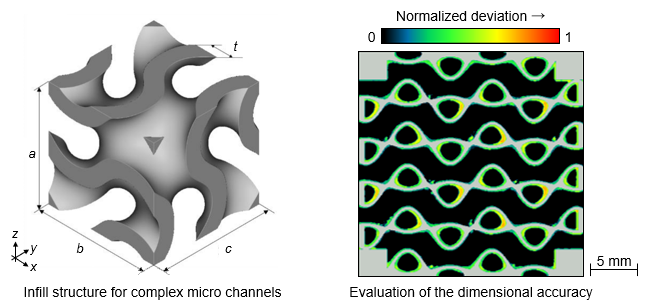ENERGIZE – Adjoint-based and additive manufacturing-enabled optimization of hydrogen combustion systems
The ENERGIZE research project focuses on improving a burner design for hydrogen combustion, a key aspect of the energy transition. Additive manufacturing technology is used to overcome the limitations of conventional design methods. The project aims to improve flame stability and emissions in hydrogen burners through model-based optimization and flow control, considering various factors such as porous structures and microchannels.
Initial situation
The combustion of green hydrogen will be of importance for the energy transition. However, its technical implementation poses a significant challenge to the gas turbine industry. Especially flame stabilization in the combustor is crucial for safe operation, but current natural gas-based solutions are not transferable to fuels with high hydrogen content. To date, however, burner design has been significantly limited by the manufacturing constraints of conventional cutting and casting technologies. This is where the incorporation of additive manufacturing technologies into the development process can be a game changer. Additive manufacturing allows burner designs that are completely detached from the limitations of conventional designs. Using conventional experimental and numerical methods, however, it is impossible to develop a burner design that considers the design freedom offered by additive manufacturing.
Objective and expected results
The main objective in the ENERGIZE research project is to fundamentally improve burner design processes by using inverse model-based techniques to optimize burner design, considering the physical and technical restrictions of hydrogen combustion. This inverse technique is based on the adjoint form of the mean flow field equations and enables a dramatic acceleration of the optimization process. As part of the ENERGIZE project, this technique is being developed for the optimization of a turbulent hydrogen jet flame, with the objective of reducing flame flashback and NOx emissions through tailored flow control. Control possibilities include porous structures, surface textures, and suction/blowout via microchannels. The approach is interdisciplinary and combines model-based optimization and flow control, state-of-the-art additive manufacturing, and experimental combustion diagnostics. This combined approach is expected to provide fundamental insights into hydrogen combustion and provide an integrated framework for the development of new hydrogen combustion technologies.
Approach
Three work packages are being worked on as part of the project. In the first work package, the analysis of base and chevron-structured porous segments is performed to investigate coherent structures and to identify setbacks. In addition, evaluation of the effects of optimized microchannel designs and fuel compositions on flame dynamics and NOx emissions will be performed. The second work package involves performing large-eddy simulations of reactive flow and applying data assimilation techniques to optimize flame flashback avoidance. In addition, adjoint optimization will be used for linear modeling and control of flame dynamics to improve the safety and efficiency of combustion systems. In the third work package, additive manufacturing of the structures is addressed, where the fabrication of porous structures under specific adjustment of process parameters is investigated. In addition, the characterization of the fabrication of complex microchannels using non-destructive testing methods will be performed. Finally, correlations between machining time and innovative post-processing methods are determined. All work packages are in constant exchange with each other.
Acknowledgements
The ENERGIZE research project is funded by the German Research Foundation (DFG) as part of the SPP 2419 " A contribution to the realization of the energy transition: Optimization of thermochemical energy conversion processes for the flexible utilization of hydrogen-based renewable fuels using additive manufacturing" (project number 500932573). We would like to thank the project partners for their excellent support and cooperation.

